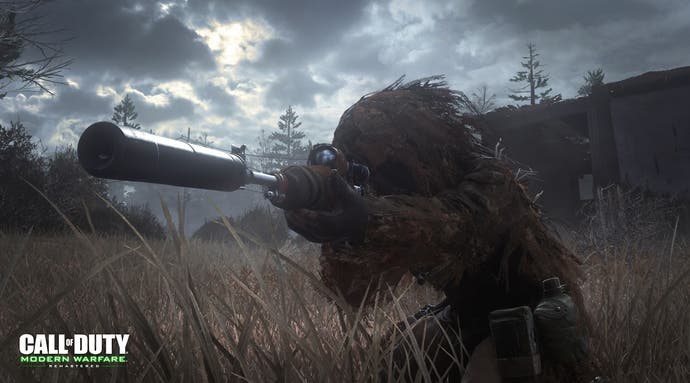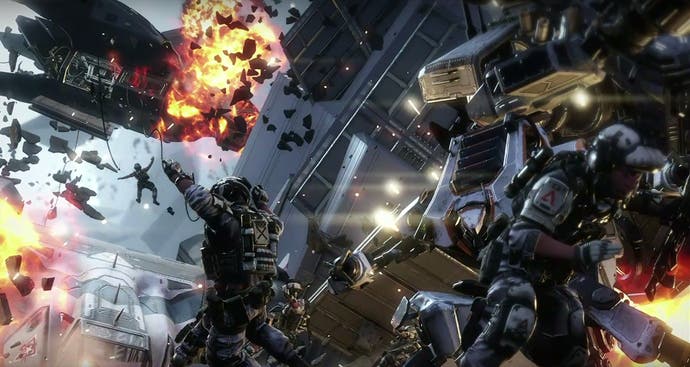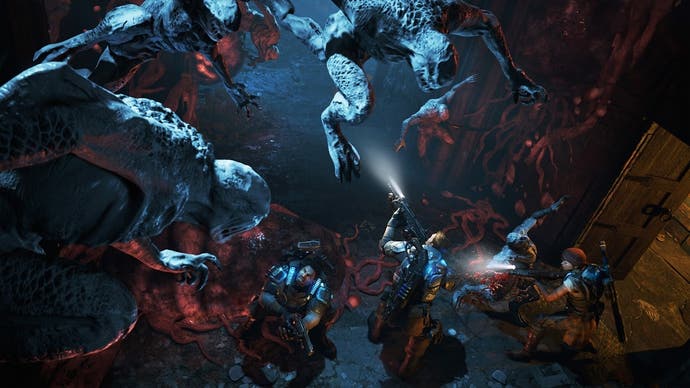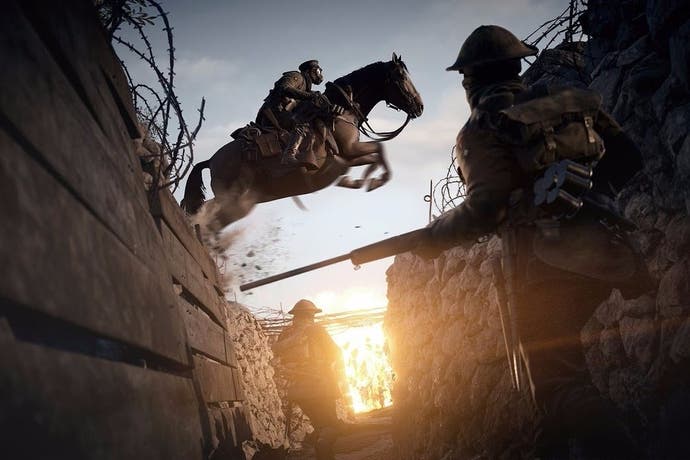How to fix the shooter campaign? Dig in
Deepening the rut.
Once upon a time, Halo was the tale of a place. A tale of it, and a tale shaped by it. Installation 04's famous skybox - that pristine curl of oceans and meadows, rearing amid the stars - may be very obviously a flat backdrop, but it does create the impression of an underlying 3D continuity, the vague conviction, as in a Souls game, that you can pick out the site of a previous battle high above the skyline, winking through the atmospheric haze.
This is a world of palpable if illusory geographical completeness, and that completeness is echoed by the way the mechanics and AI variables circle back on themselves - each action provoking a clean reaction as Elites dart back and forth and Grunt morale gives way in the firestorm. Fast forward to last year's Halo 5, and these graceful loops of terrain and gunplay have become a tangled octopus construct, draped across planets, plot twists and protagonists, arresting at intervals and undeniably majestic, but scattershot and oddly throwaway in their scope. Perhaps this is just the usual series feature-creep in action, as designers pile more and more weight onto the same proven ideas, but I can't help but wonder if the minds behind Halo, among other shooter developers, have forgotten something basic about the business of action game storytelling - the necessity of giving your setting a chance to shine.

Depending on who you speak to, single player modes in first-person shooters are either dead, dying, or little more than a convenient narrative manure for multiplayer map concepts. Online-only games such as Overwatch and Destiny now command the spotlight, their brisk dabs of characterisation far better suited to Twitter consumption than any plodding exercise in chapters and cutscenes. Bastions of the old school like Halo increasingly resemble polar bears fighting for space on a melting iceberg. Battlefield's narrative outings are a running joke, while Call of Duty has retreated into self-parody. Uncharted remains a blast, and the new Gears of War seems confident if extremely cautious, but Medal of Honor is missing in action, BioShock has been kicked into the long grass and Half-Life is a fading memory.
A grim time, indeed, but traditional FPS campaign design has mounted something of a resurgence in the past few months, with Doom ripping a bloody hole in the idea that nobody buys shooters for the story (whether it has made back all the money id and Bethesda spent on it is another question). Titanfall 2 will offer a single player component in place of the original's poorly received "campaign multiplayer" - a significant change of tune, given Respawn co-founder Vince Zampella's remarks in 2013 about the expense of creating a campaign relative to how much time players actually spend playing them. The launch of new virtual reality headsets has also given first-person storytelling at large a shot in the arm, though twitchier genres may not reap the benefits for technical reasons, and the announcement of various classic FPS remasters naturally speaks to a lingering, if well-buried enthusiasm for checkpoints and chokepoints.
So what can developers do to bring back the glory days of the shooter campaign - the era of All Ghillied Up, Fort Frolic and Silent Catographer? The answer, I think, is to dig in. For my money, present-day shooters are hell-bent on creating variety at the expense of sustaining interest for a particular setting or scenario, the result being that players are unable to bond with the tales they tell. Rather, we're kept in a state of perpetual distraction. There are too many jump-cuts, too many spasmodic shifts of perspective or tone, too much shuffling of the scenery for fear of boring the player by spending longer than half-an-hour in one region.

Battlefield: Hardline is an especially frustrating case. A trip through Miami by station wagon early on reveals a backdrop of startling nuance and grubbiness - scratched windshield glass and beggars at the traffic lights, the crash of trashcan lids and the doleful buzz of passenger jets. But these touches are forgotten as the campaign bounces onto heist sequences and desert shoot-outs, ransacking HBO's archives for setpieces while players do their best to keep pace. In the process, a story that might have been an exploration of how it feels to uphold the law within a community of known offenders becomes a flamboyant, inconsequential and irresponsible bout of cops and robbers.
I fear that this year's Battlefield 1 may meet a similar fate. Steering representations of the First World War away from the trenches of Normandy is a worthy aim in itself, but if the result is that we end up dancing from battlefront to battlefront - the forests of the Argonne, the Italian Alps and the Arabian deserts, to cite those currently on the menu - the game may ultimately trivialise the events it seeks to depict, reducing them to postcard moments on a global package tour. I don't think DICE has a duty to portray World War 1 "faithfully", whatever that means, but I do think Battlefield 1 will be a better game if the campaign actually commits to a particular corner of the conflict, rather than switching things up for novelty's sake.
There is so much to be gained by stopping to smell the roses, especially considering how much money is now spent on videogame art - a colossal investment that receives small regard as the narrative whisks players from hotspot to hotspot. It doesn't really belong in the same category as Call of Duty, but I can't pass up the opportunity to talk about the original Dead Space, a game that is much smarter than its overt debts to Alien, Event Horizon, BioShock and Resident Evil would have you believe.

Few horror games go about investing the environment itself with a grisly, creeping sense of life recently departed as convincingly as this, and as with Halo, the mechanics, setting and narrative goals echo one another cleverly. The good ship Ishimura is a diseased, mangled body and your job, as engineer cum surgeon Isaac Clarke, is to stitch that body back together, unclogging arteries of communication and rerouting power networks even as you dismember and eviscerate the Necromorphs who stand in your way. The game's nods to other works of science-fiction can be incredibly clumsy, but they can also be quite calculating. Named for two legendary science fiction authors, Isaac Clarke is as much a palimpsest, a bundle of grotesquely sutured cliches, as the ship he must restore and the creatures he must slay.
Above all else, designers would do well to remember that Call of Duty wasn't always the seismic, unscientific rollercoaster ride it is today. No FPS franchise is as notorious for arbitrary shifts in time and place, but the older games walked a gentler path than last year's Black Ops 3. The original Modern Warfare's paired Hunted and Death from Above missions are ostensibly paradigmatic of that jerky, MTV-inspired approach to narrative - one minute you're ducking through cornfields and fighting over greenhouses in the pre-dawn murk, the next you're a few miles up, lounging at the controls of an AC130 gunship. One line of dialogue - "this is going to be one hell of a highlights reel" - even speaks to the campaign's fragmentary feel directly, but there's more to the switch of perspective than a change of pace.
I played through Modern Warfare again recently and was struck by how those two missions are, in essence, complementary investigations of the same scenario - the first pitches you into a dark, dense landscape under heavy fire, the second shows you that landscape from above and through an infra-red scope, a target-rich environment laid out in ruthless monochrome. It's no Green Zone or even Black Hawk Down, but as in Halo, there's an imaginative feedback loop at work, a deepening of your appreciation for the specifics of a place. I doubt this year's Call of Duty: Infinite Warfare will try its hand at anything as considered - the subtitle alone sounds like it belongs in a straitjacket - but the accompanying Modern Warfare remaster should, at least, remind us that the series once knew the value of pausing for thought.




-3-31-23-screenshot.png?width=291&height=164&fit=crop&quality=80&format=jpg&auto=webp)




